Imagine this: you kick your feet up after working for a couple of hours from home. You made more than you would in a week with a 9-5 job.
That can be your reality as a successful freelance writer.
The truth is that extremely few writers will ever reach this level.
Many lack the discipline and strategies to get this far.
But you’re different.
And that’s why I’m going to teach you the exact strategies I’ve used to get freelance writing jobs in no time.
Practicing these techniques over time is guaranteed to help you earn money and build a serious name for yourself as a writer.
Let’s dive in!
Freelance Writing Job Boards
I recommend to all new writers that you apply for freelance writing gigs on job boards.
It’s easily the best way to get your feet wet, build a portfolio, and start getting cash flow coming in.
Freelance job boards for writers allow businesses to advertise writing positions, and you can apply for them.
Here are a few that you should check out.
JournalismJobs
Do you want to write for newspapers, online magazines, and similar publications? Then you need to start applying for freelance writing positions on Journalism Jobs.
It’s the go-to source for journalist positions, and magazines often pay some of the highest rates in the industry.
Begin by searching for a job through the home page search bar.

Enter a keyword in the “Title” section and choose a location if you want to narrow it down to a specific state. Click the green search button afterward.
It will display how many jobs are currently posted and you can filter the results by industry, position type, and more from the left side.
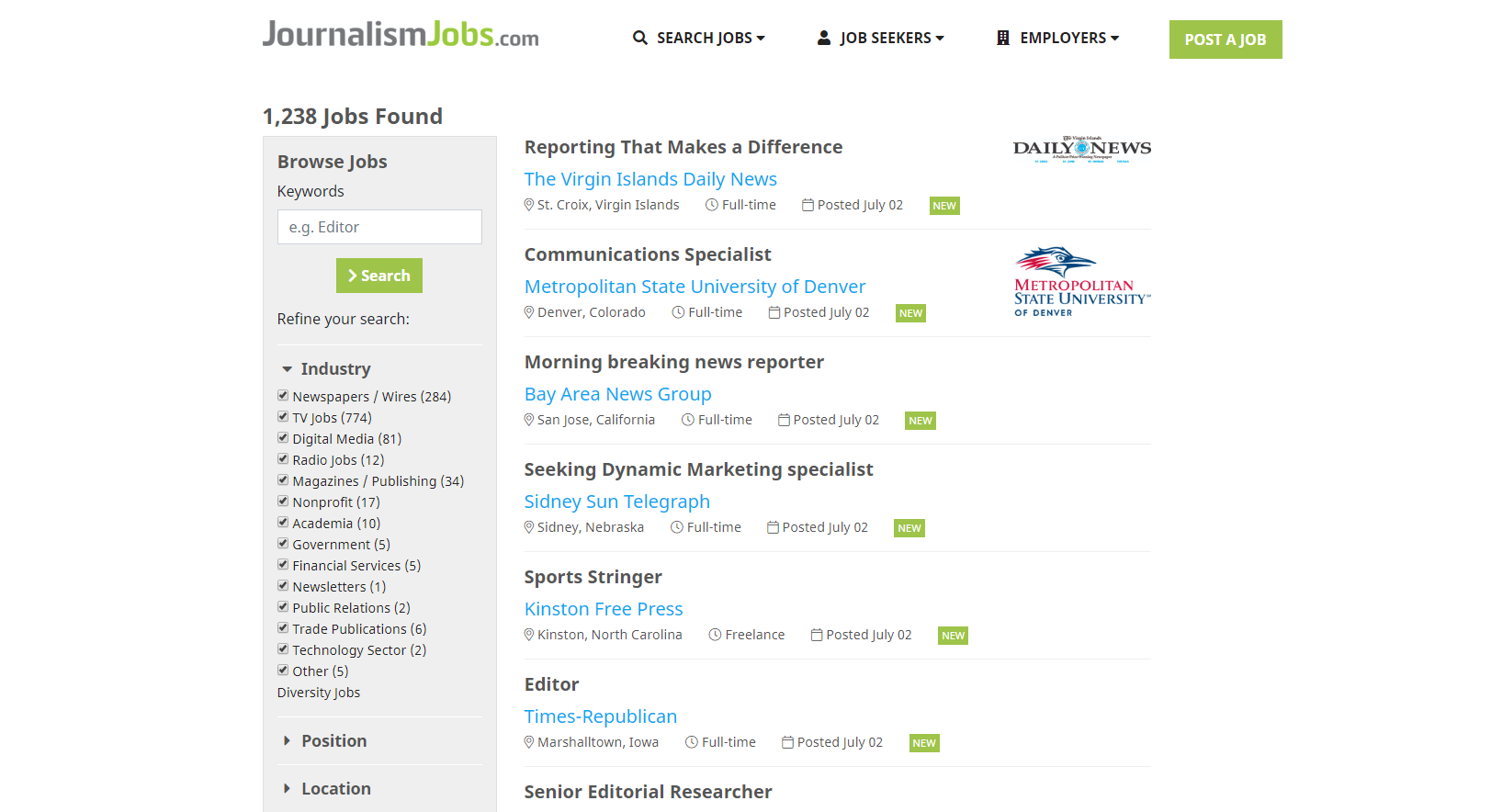
The jobs themselves are listed with their title, publication, location, and position type.
Click any that interest you.
Job postings will include detailed instructions on how to apply along with duties, responsibilities, and more information related to the gig.
Most of the job pages will have a button at the bottom to apply, too.
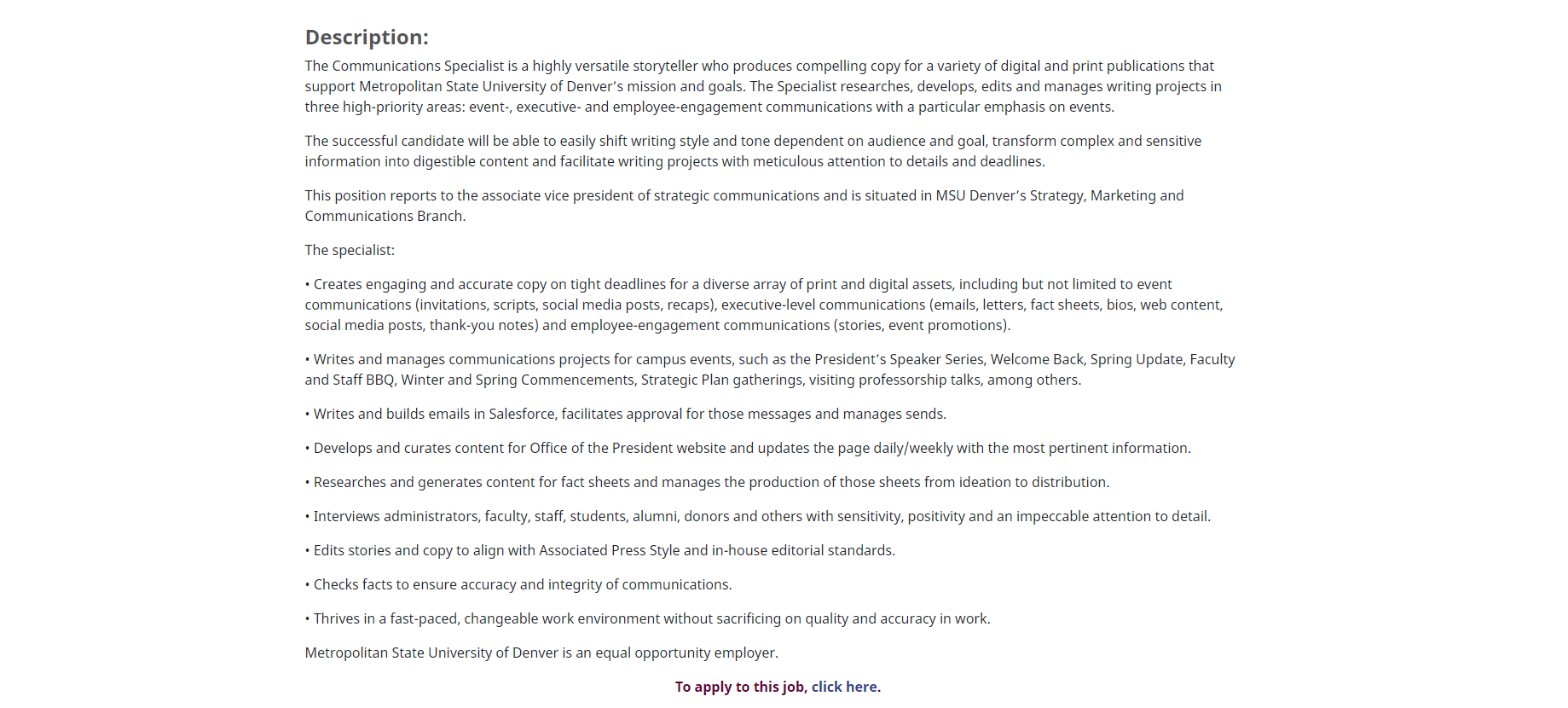
JournalismJobs is updated frequently so I would keep an eye out for this job board on a daily basis.
AllFreelanceWriting
This website is dedicated to helping writers find good-paying jobs, get exposure, and teach them valuable things about writing.
You can access their job listings here.
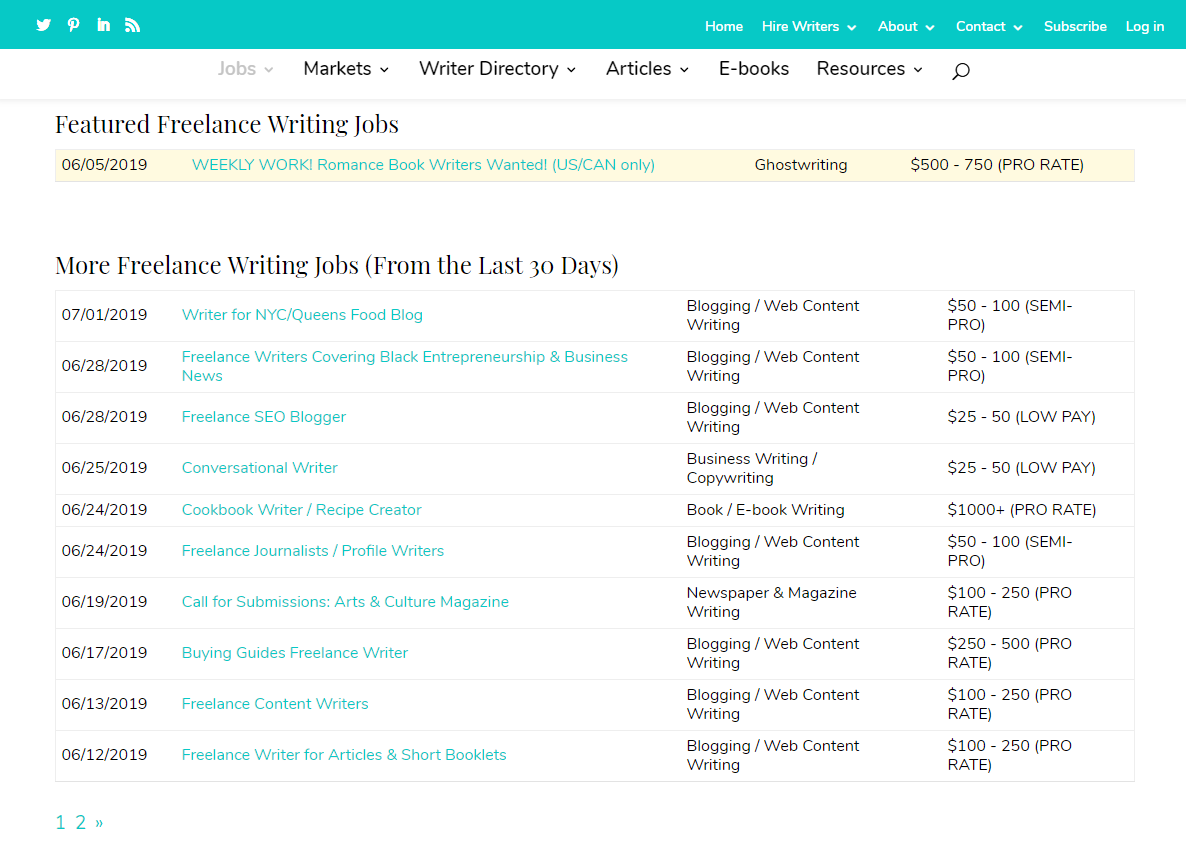
They add new jobs almost every day, and they pay anywhere from beginner to professional rates.
You will find writing jobs for books, blog posts, and many other forms of content.
This is nice because it creates the opportunity to try out different industries and niches to find what suits you best.
Click a job listing that interests you. It will display the pay, location, and application instructions on the next page.
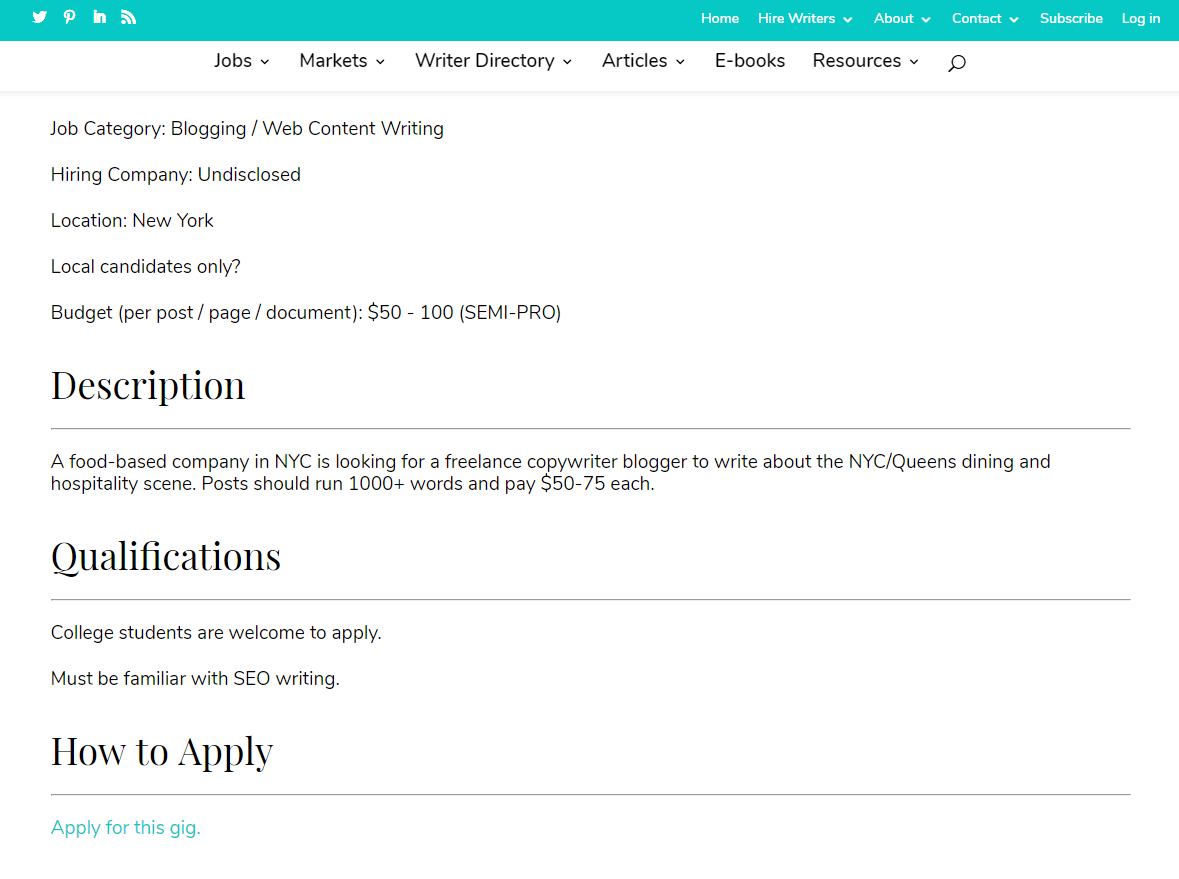
An interesting feature of their website is the writer directory. You can pay a small fee to be placed in their directory to be found by clients organically.
How cool is that?
Imagine getting emails from interested clients and you didn’t have to lift a finger!
You can post your profile by visiting this page. They will ask you for:
- Your name
- An email address
- A profile headline
- Location
- Website link
- A profile category
- Your writing rate
- Experience summary
- Qualifications
The one-time fee to be posted is $24.95 which is very reasonable considering they have a big audience.
Freelancewriting.com
FreelanceWriting was established in 1997 and is one of the oldest writing websites on the internet.
They also happen to have one of the best freelance writing job boards since they compile listings from all across the web.

Results can be filtered by the newest listings, required skills, job type, and more.
Use the filters to find precise jobs you’d be amazing at.
Click the blue “Apply Here” button when you do.
This will forward you to another page that outlines the position, and another application button.
Many of these links will take you to websites like Indeed where the job was originally posted.
Tips for pitching freelance writing job boards
I know writers who have made insane money from freelance writing job boards.
I also know writers who’ve spent months pitching and had nothing to show afterward.
Do you know what the difference was between the two?
Their pitches.
The reality is that if your pitch sucks, you aren’t going to land any work.
A pitch needs to stand out, be straightforward, and prove that you’re an excellent writer.
Here are some tips to create pitches that will make businesses chase after you:
- Keep it short: As a copywriter and someone who hires people, I’ve been on both sides of the stick. I learned quickly that long pitches get thrown into the trash can faster than you can hit the apply button. Keep your pitch down to a paragraph or so to make it easier to read for the employer.
- Don’t be afraid to name-drop: Have you written for a notable publication before? Talk about it! It isn’t superficial. Working with larger websites means that you can meet their editorial standards and have the skills to do so.
- Talk results: You went to Yale for a writing degree and have 5+ years of experience interning as a copywriter. Nobody cares. Did you generate companies significant website traffic or revenue thanks to your writing? Mention that instead. Businesses want results at the end of the day.
While freelance writing job boards can serve as the foundation of starting your journey, you also need to approach this career as a real business.
This brings me to my next point.
Outbound Sales (Cold Email, DMs, Etc.)
Look at some of the biggest companies in the world.
Do they wait around for clients to come to them?
Hell no!
They pick up the phone, start dialing, and pitch until they have an overflow of work.
This is precisely why I recommend every writer trying to build an agency or ramp up their client list to create an outbound sales strategy.
But let me tell you something…
I hate cold calling. In fact, I’ve never done it!
I’ve gotten most of my high-paying clients through cold emailing. I wrote an in-depth guide you can read on cold email campaigns to learn my exact process.
I’d like to briefly cover how you can pull it off in this article, too.
Create a list of leads
You can’t cold email if you don’t have any email addresses to begin with.
That’s why the first step is to first decide who you would like to have as a client.
It doesn’t have to be specific brands, as you can begin with a buyer’s persona. This is an idea of what your ideal client looks like. Think of traits such as:
- Revenue
- Company size
- Industry
- Products or services offered
- Amount of employees
- Etc
I really enjoy working with 7-8 figure B2B agencies for example. I work with many other companies that don’t fit this mold, but it’s my go-to.
Once you have done this you need to create a list of websites.
A great database to use is Angel List. They compile all of the latest startups in one neat location which is perfect for lead generation.
We will be extracting emails from their URLs so this step is mandatory.
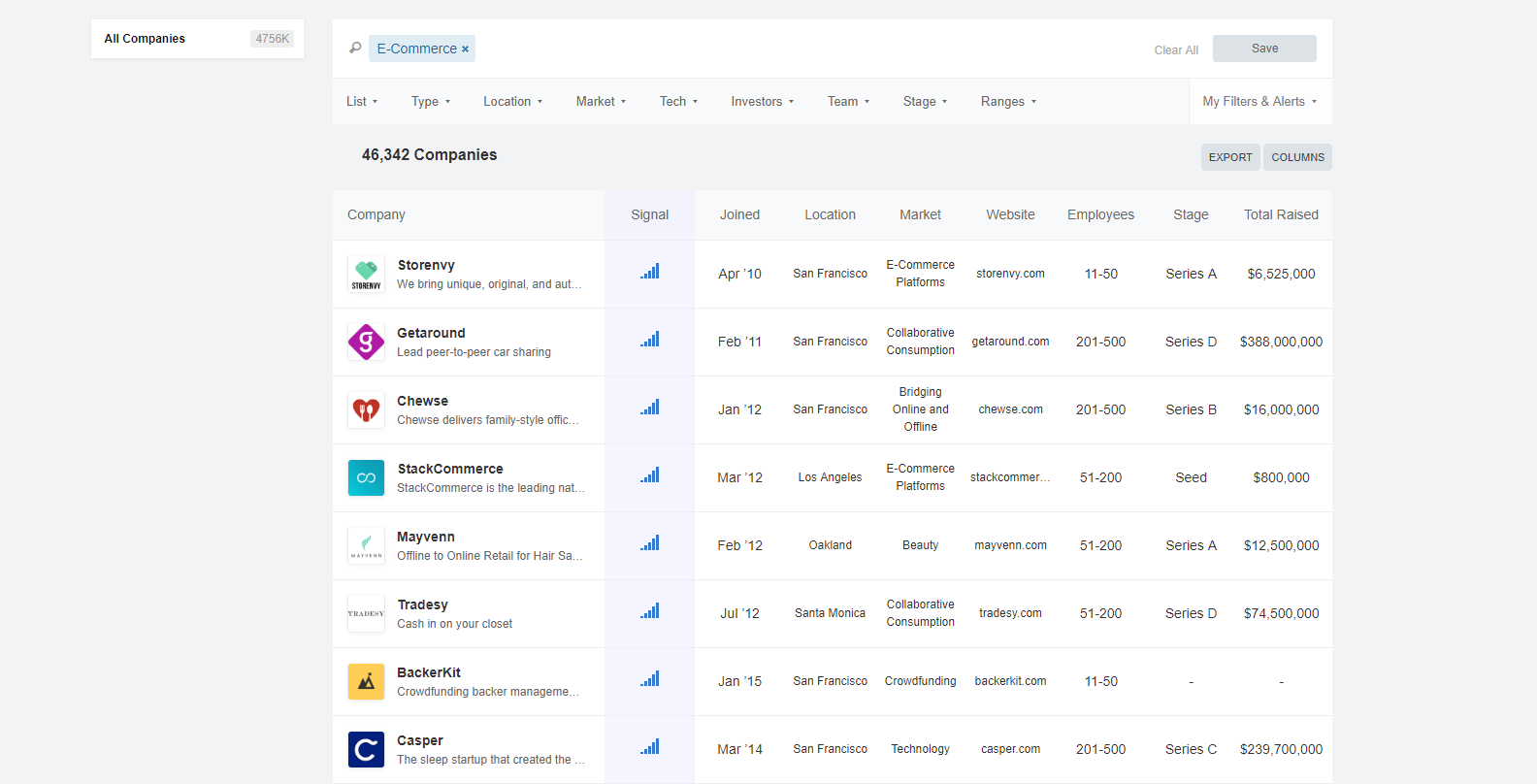
You can narrow down the companies by market, investment stage, and more filters.
I recommend copying any websites that you match your buyer’s persona into a spreadsheet to stay organized.
Let’s take it easy, so begin by collecting roughly a dozen websites before the next step.
Get the emails of marketing executives
With URLs in hand, you can paste them into a tool like Hunter.io to extract all of the domain’s emails.
I’ll quickly run you through how to use this tool but feel free to read my Hunter.io review to learn about it in-depth.
Make sure to check out their list of 55 subject lines that have 70%+ open rates as well.
Sign up for a free account and enter the URL of a website into the “Domain Search” bar.
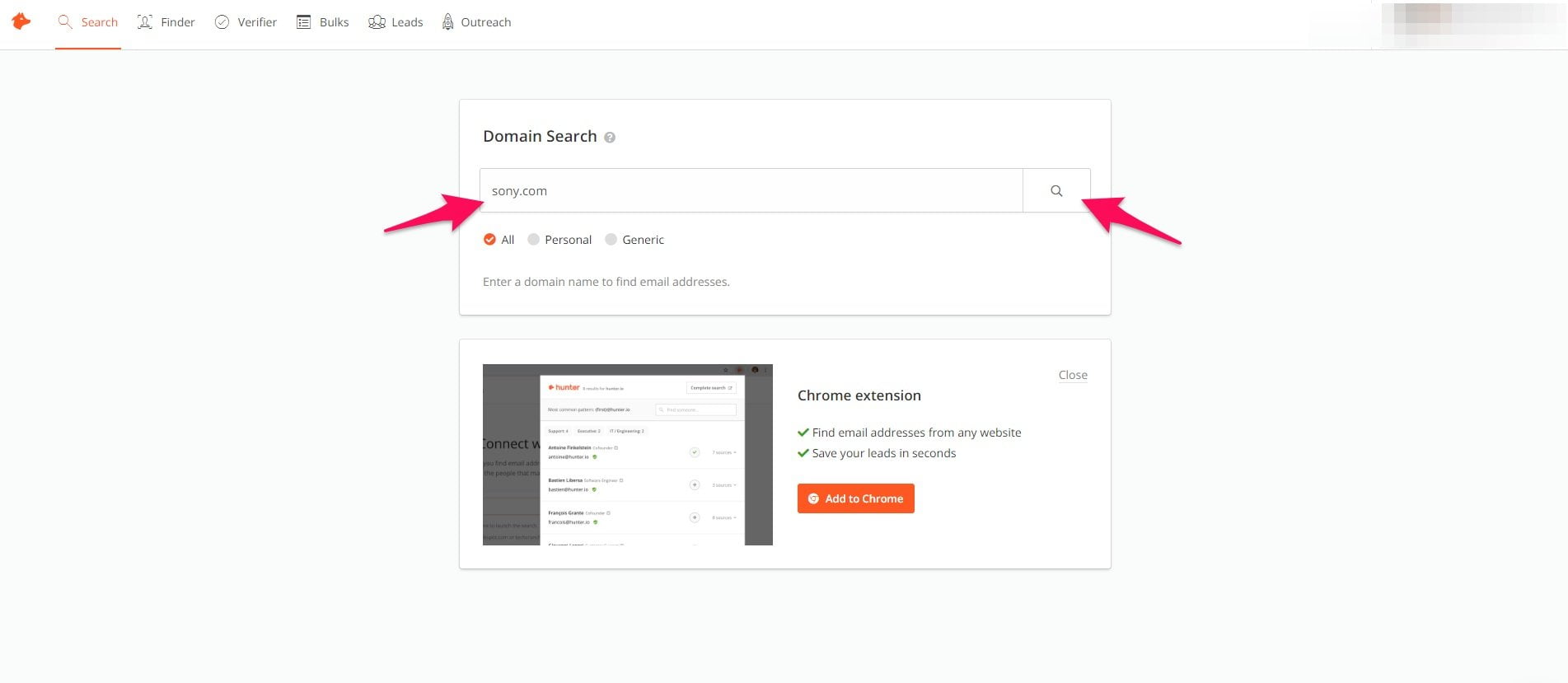
This will display a list of all associated individuals along with their email, position, phone number, and more.
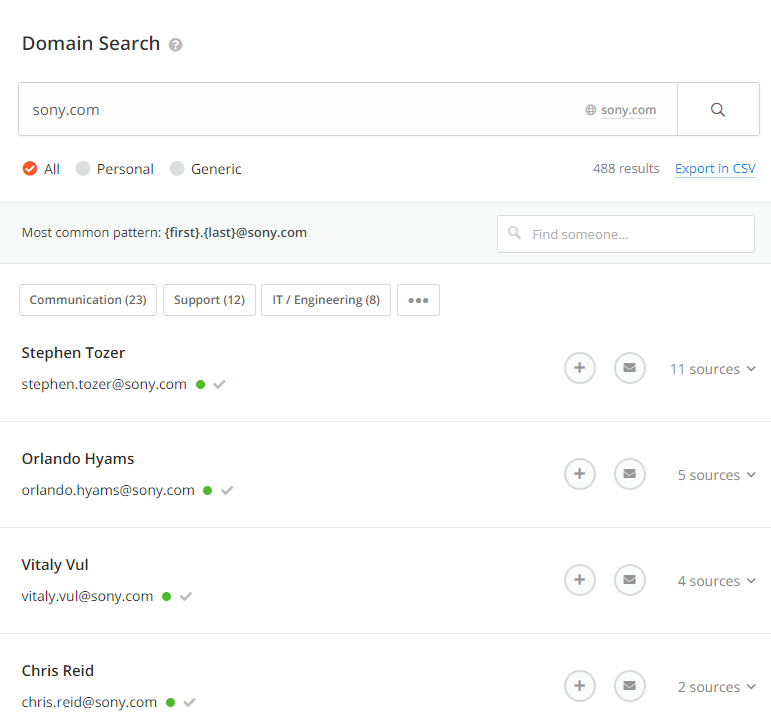
Save these results individually or export them as a CSV file to upload to Google Drive afterward.
Find executives in charge of marketing since you’re pitching writing services, as well.
I’ve noticed CEOs and founders can be in other good positions to pitch if you can’t narrow down any individuals in charge of marketing.
This brings us to the last step.
Send them a personalized pitch
The key to successful cold emailing campaigns is personalization.
Everybody and their mom can see right through a copy-and-paste email template.
I’ve been told many times by leads that I’m the only cold email they’ve responded to because it was genuine and sent to the correct person.
A little bit of upfront work can really pay off.
Here are the keys to sending personalized cold emails:
- The subject line should include the lead’s first name or company name. “To {First name}” and “Question about {Company name}” are simple but powerful.
- Mention the lead’s name and company name once or twice again in the email body.
- Keep the email itself no longer than a paragraph.
- State a custom observation such as “I love the work you did recently with Pepsi and Adidas.” This shows that you performed research and aren’t another bot sending out mass emails.
- Be straight to the point about your writing services and what you can do for the lead in terms of generating results.
- End it with a call to action like scheduling a phone call, or meeting, or asking if they require your services.
Here’s a great video by Alex Berman on how to write cold emails that always get read which elaborates on this further:
Network your butt off
Did you know that the close rate for in-person meetings is 40%?
That’s higher than practically any other channel for interacting with clients.
It’s also exactly why I believe in networking as a freelance writer.
Businesses will always need copy written for their websites, advertisements, and other material.
Here’s how to begin networking today.
Check out Eventbrite
Eventbrite is a free platform that lists all of the networking events happening locally.
I love checking it every month and mapping out at least one or two events I can attend.
It’s also a great way to make entrepreneur friends.
Simply choose a category or enter a keyword and select your city. You’ll see results like this:
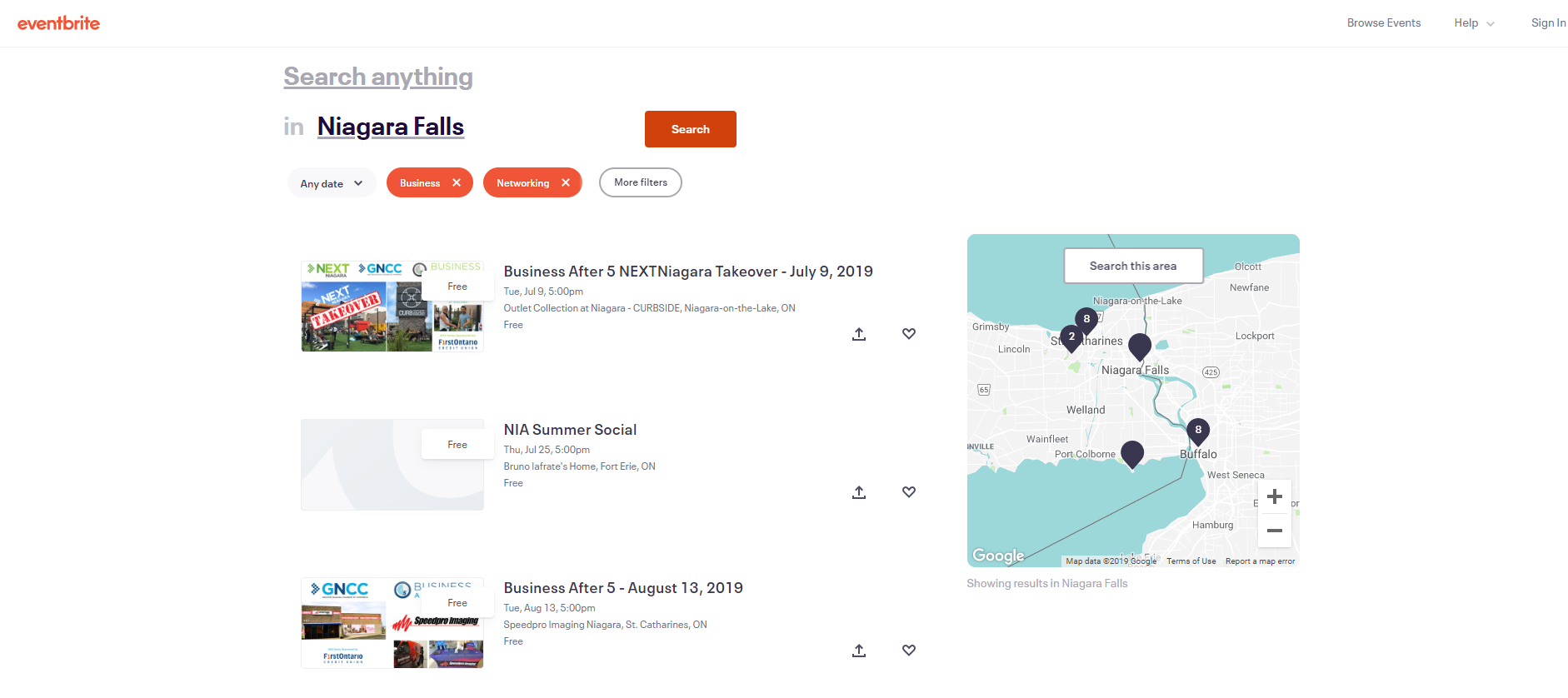
Tons of events are completely free so you can show up and network without spending a dime.
Other events may require you to buy a ticket for roughly $20 which isn’t a bad investment, either.
I have seen certain conferences cost hundreds to thousands of dollars, but I’d wait until you’ve gotten great at networking before attending one of those.
Find a local Meetup group
Another website you need to use for finding networking events is Meetup.com.
Truthfully I noticed that if you live in a small town your options will be limited, but don’t be afraid to travel if you fall into this category.
I’m from a town of 80,000 people so there’s practically nothing going on, but suddenly there are groups with tens of thousands of active members when I drive one hour away to Toronto.
Type in a keyword and choose your city with a distance filter via the explore page.
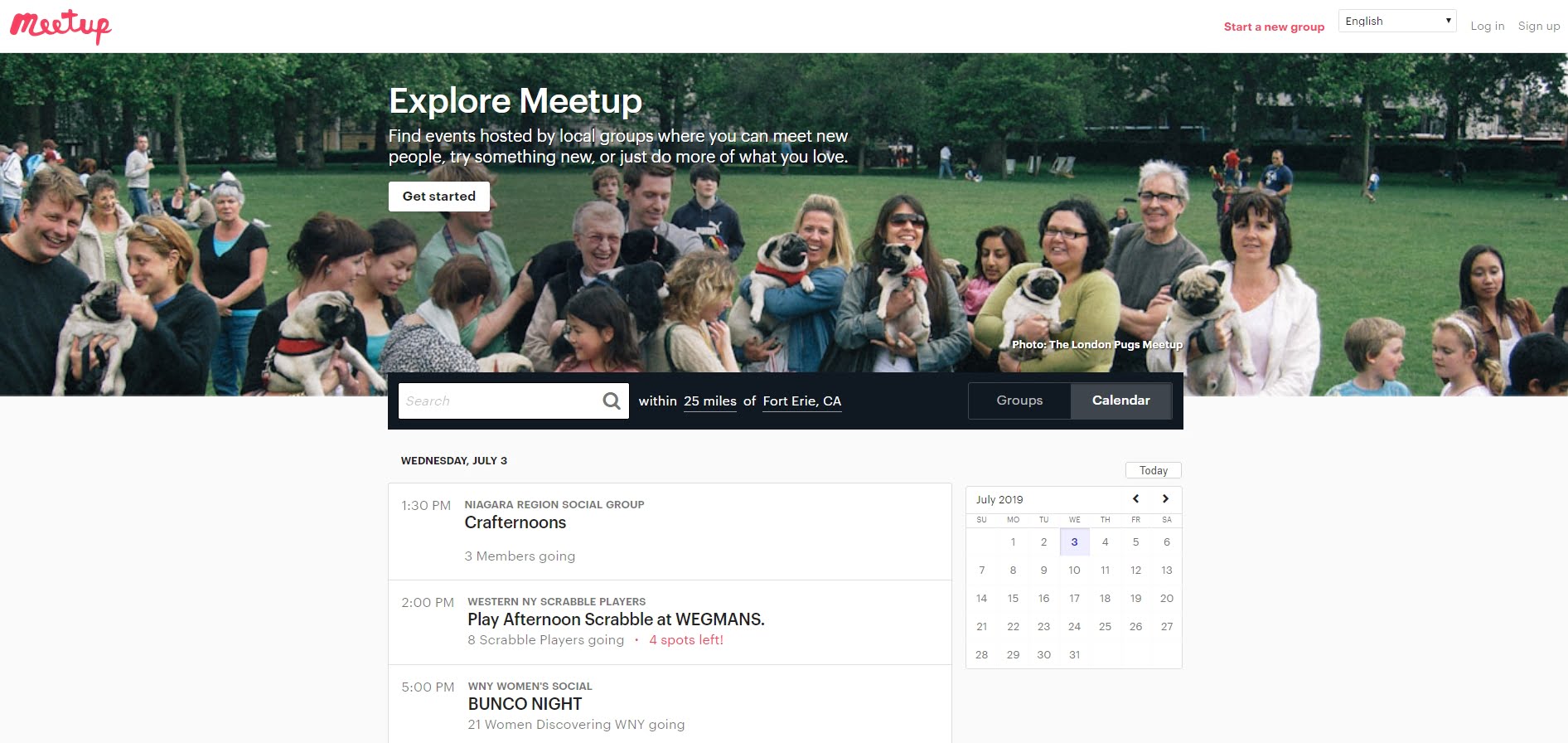
Good keywords to search for include:
- Business
- Startup
- Entrepreneur
- Sales
- Marketing
- Tech
- Digital
- Career
These will net you the most relevant business-related meetups to attend where you can potentially find valuable writing clients.
As nice as it would be to show up to these events and have leads lining up to meet you, it just isn’t the case.
You need to follow certain rules and etiquette to maximize your experience and results.
Here are some practical tips…
Networking tips
- Dress the part: Wear a suit or business casual clothing if the weather permits. If it’s an outdoor event in the middle of summer, loafers, shorts, and a polo or dress shirt are more than appropriate.
- Bring cards: Don’t shove cards down people’s throats, but have them handy in case someone asks for your information.
- Take action: It can be nerve-racking walking up to strangers, but if you do it often enough it will become second nature. Get in the habit of starting conversations as you will get more bang for your buck at events versus waiting to be approached.
- Follow up: Text, email, or call the people you connect with at events to stay in touch.
- Be yourself: You need to represent your business in a positive way, but don’t try to put on an image of a stiff entrepreneur if that isn’t you. Crack some jokes, get personal with others, and be you.
Follow Job Board Tweets (Yes, Really!)
I mentioned job boards earlier.
However, you don’t need to directly apply to the board itself to find opportunities.
What do I mean?
You see, job boards also post new job listings on their social accounts including Twitter.
And, let’s be real. You’re probably already spending a lot of time on there already!
Follow job boards such as Write Jobs, Who Pays Writers?, and JournalismJobs.
They will post alerts of new jobs like this:
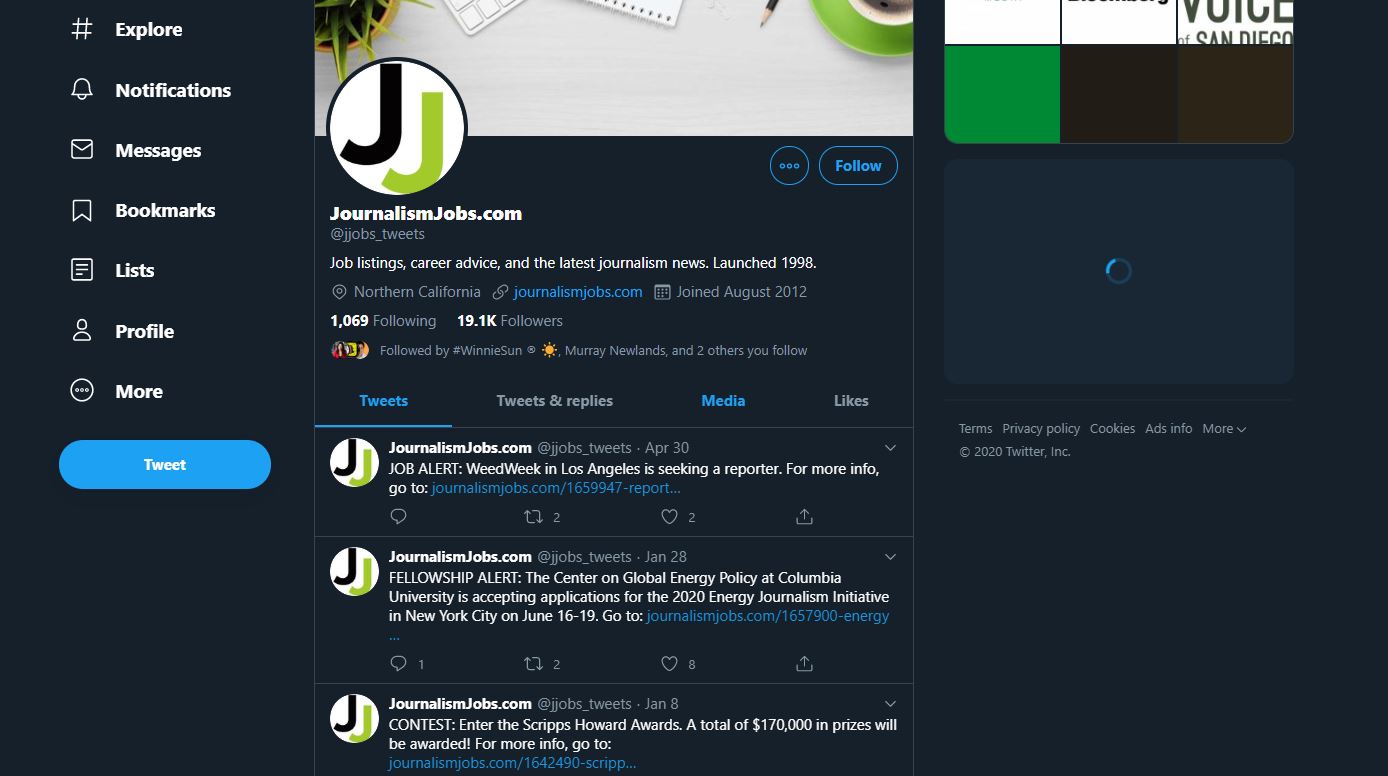
You will be one of the first people to see positions, giving you a slight edge over other writers.
Ask Friends and Family—You’d be Surprised
Networking at conferences and events is great. I do it all of the time and I think it’s a great way to get your hands dirty and find leads.
Sometimes leads are right under your nose.
A.K.A your immediate existing network like friends and family!
There are many successful freelance writers who launched their careers by simply proving their social circles.
For instance, I’m reading the book Company of One on growing a lean business and they gave the example of a freelance writer who asked friends and family for projects and now she’s booked one year in advance!
It’s as simple as sending out a message on every social platform like this:
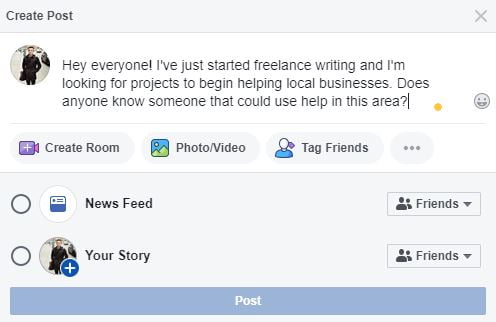
Don’t stop there.
I want you to also text everyone you know who could possibly use your services or is connected with others who could.
The message should be the exact same.
Then, email the same thing out to your list.
I don’t care if it’s your grandma or uncle’s dog, email them and ask if they can get you some initial work.
Blog (You’re a Writer After All)
I acquire all of my high-paying freelance writing jobs through my blog and SEO.
I’ve used all of the strategies I’m teaching you today with massive success, but nothing comes close to this very website you’re browsing right now.
It’s landed me clients that pay me up to $5,000/month or more for content and copy.
Here’s how you can achieve the same thing:
Step 1: Launch a blog. It takes two minutes.
No, you don’t need to know how to code.
No, it doesn’t take weeks to launch a website.
Nowadays a website is as easy as clicking a button or two and it’s live.
Don’t believe me?
Head over to the website builder Squarespace and get a free trial.

Choose an appropriate category for your website.
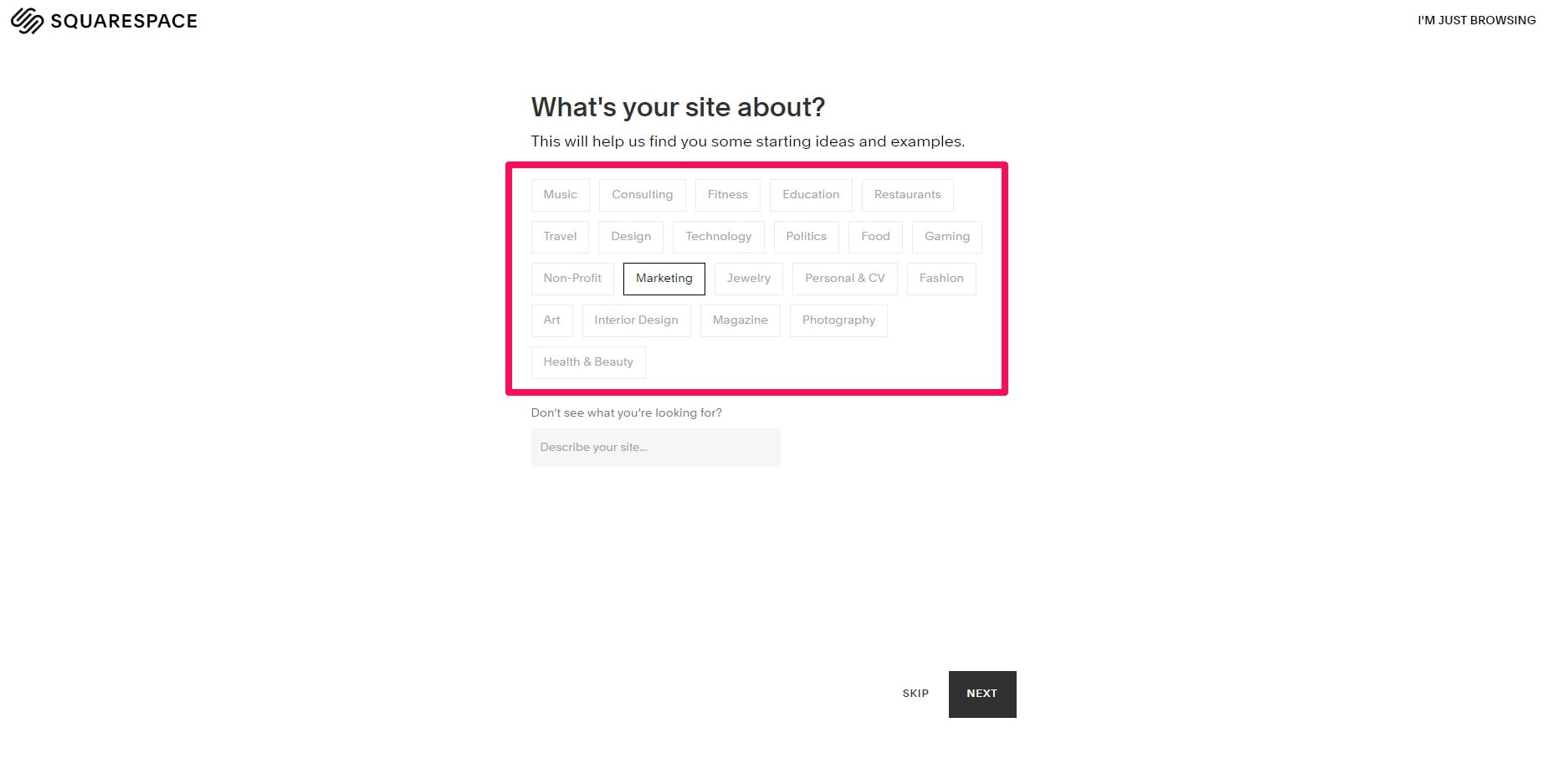
Then, choose a goal such as turning a passion into a website.
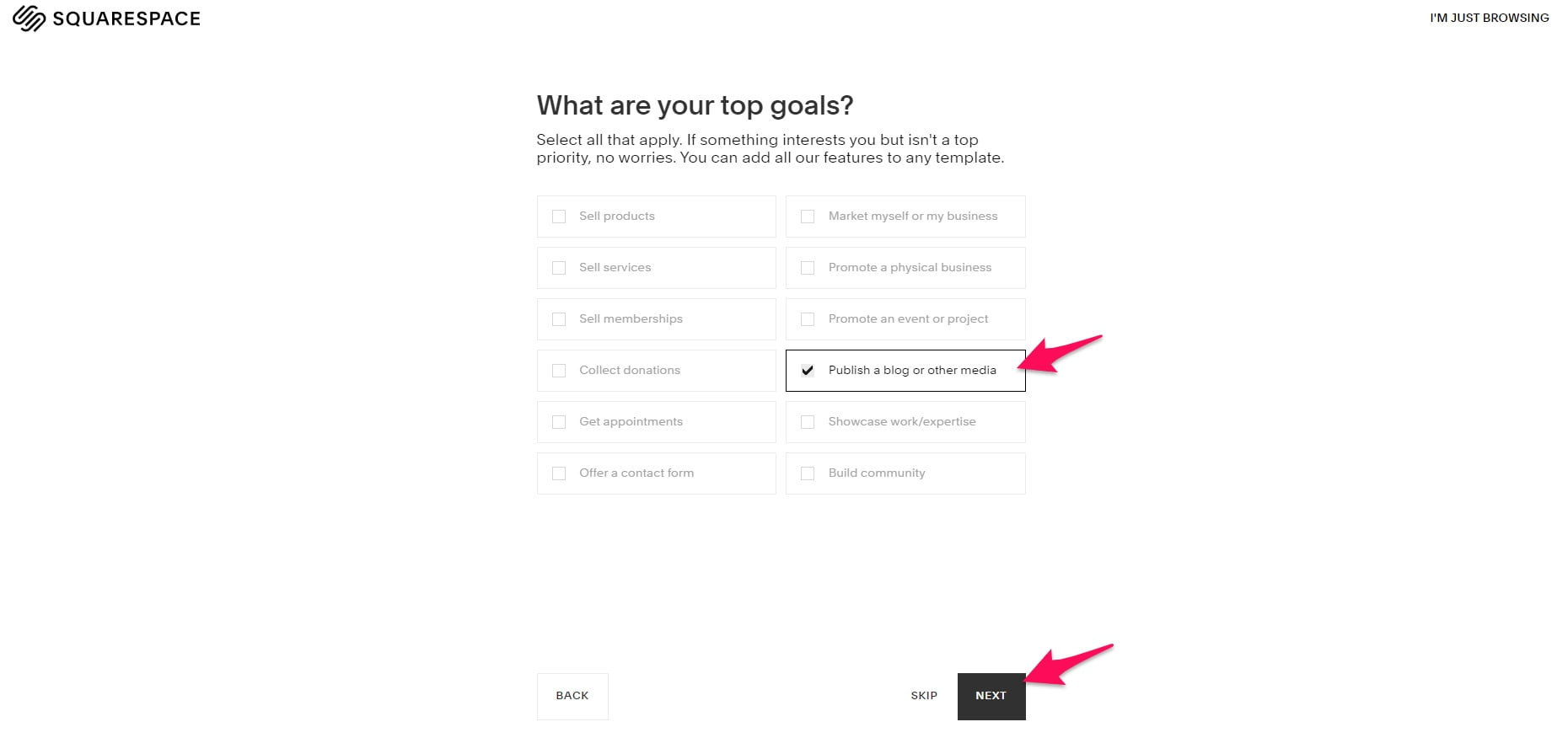
Finish the setup wizard and register with an email or Google account afterward.
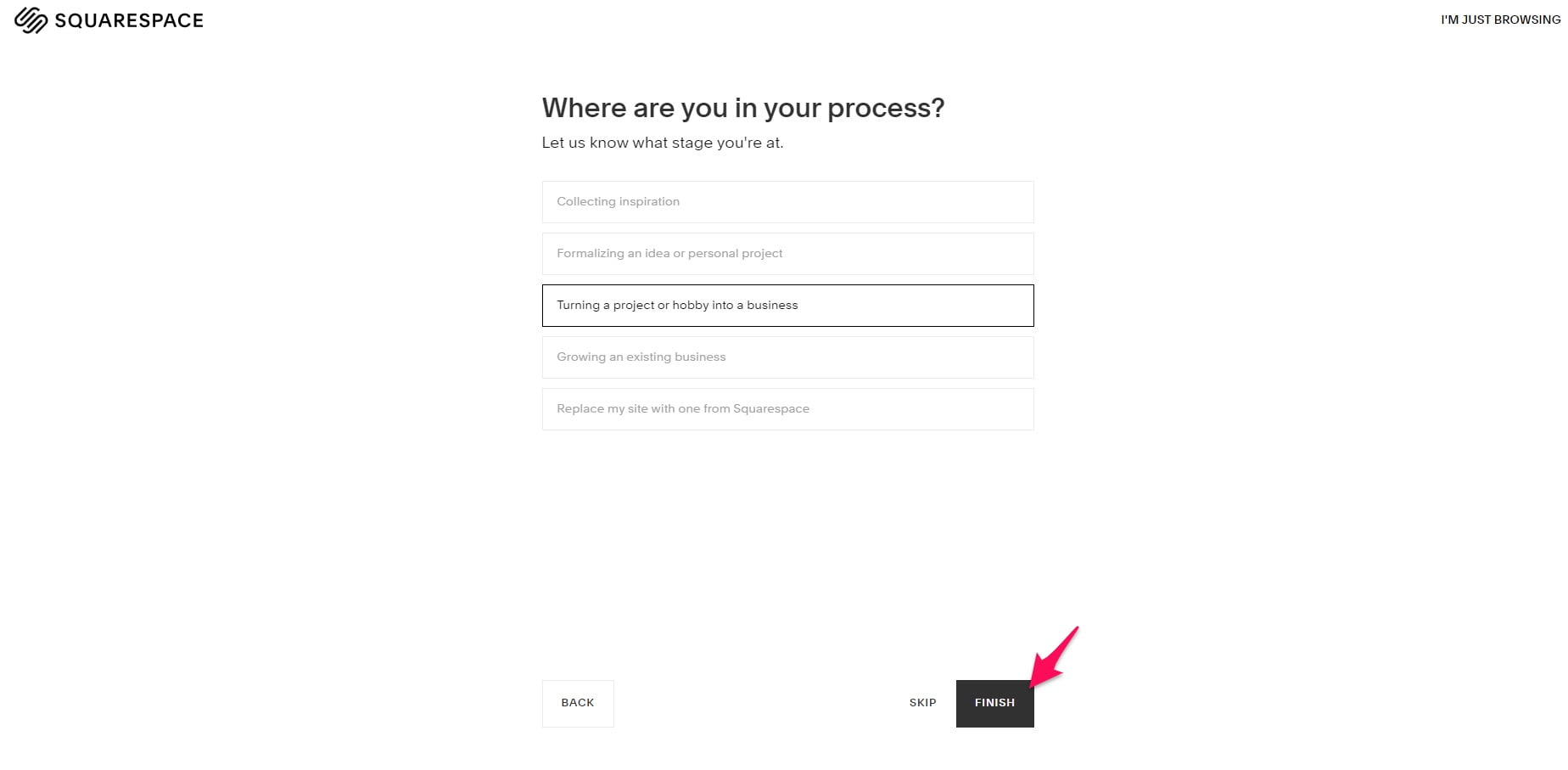
Select one of Squarespace’s professional templates after this and you can begin setting up your wizard.
Most importantly we can begin blogging which starts in the next step.
Step 2: Research topic ideas
As nice as it would be to blog about your cat and get writing jobs, it doesn’t work that way.
Rather, you need to write about topics that your ideal clients care about to attract them to your website in the first place.
Then they can check out your services and learn about you to begin working with you.
I recommend using a tool like AnswerThePublic.
Begin by entering a keyword on the homepage and click “Search.”

This will give you topic ideas in the form of questions, prepositions, comparisons, and more.
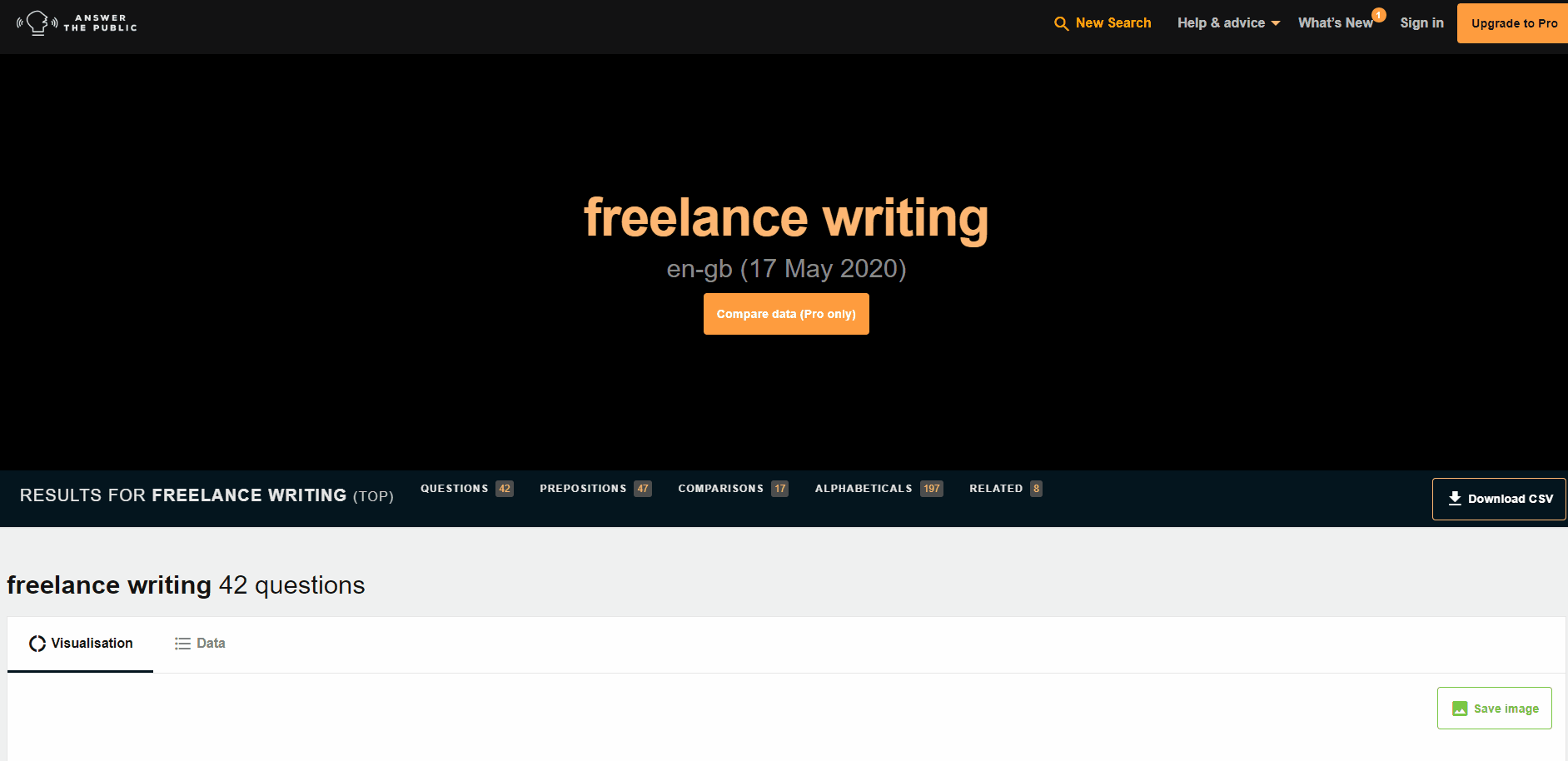
Export these as a CSV file to use as inspiration later.
Step 3: Write content that ranks and generates leads
Back in the old days of Internet marketing, you could write a few hundred words and call it a day.
Not anymore.
Great content is hard to come by and takes blood, sweat, and tears.
While it can seem intimidating, it’s a good thing.
Here’s why: top-quality content is rewarded with more organic traffic and freelance writing job leads.
Put in the work now and your bank will be smiling later.
But, you’re probably thinking, “What makes great content?” and there are three main components:
- SEO: Learn to optimize keywords, URLs, title tags, and meta descriptions.
- Utility: Offer tools, step-by-step instructions, and resources to help readers take action.
- Credibility: Use data, statistics, and studies to back up any claims you make.
Keep a regular publishing schedule to see the best results.
Invest in my copywriting academy that teaches students how to make a living online writing if you’re serious about this career path.
Wrapping Up How to Get Freelance Writing Jobs
Freelance writing can be a seriously lucrative career path.
There are writers that make six to seven figures once they’ve established a name for themselves.
You need to need to understand the proper strategies and processes to get here or else you’ll flop, though.
I’d recommend beginning by pitching writing job boards to start landing gigs, earning cash, and building a portfolio.
From there you need to try it like a real business by implementing an outbound sales process.
Cold emailing with tools like Hunter.io is my go-to approach, but you could cold call, invest in lead gen services, etc.
Finally, don’t underestimate the power of networking. You’ll meet tons of like-minded people and find great writing opportunities at conferences.














